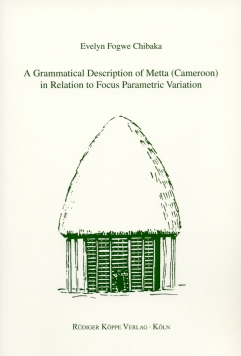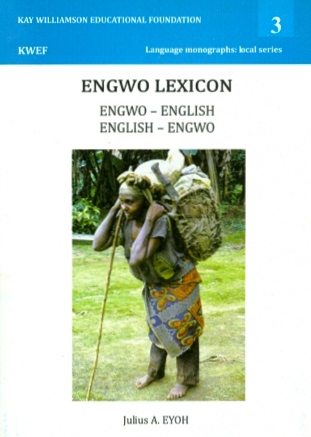

A Grammatical Description of Metta (Cameroon) in Relation to Focus Parametric Variation
Evident in Focalisation and wh-fronted Questions
Author: Evelyn Fogwe Chibaka. Series edited by: Wilhelm J.G. Möhlig †, Bernd Heine.
Series: GA Grammatical Analyses of African Languages Volume 28
20064 pp. Roman, 203 pp.
2 maps, numerous tables and graphs
Text language(s): English
Format: 160 x 240 mm
420 g
Paperback
€ 39.80
Buy 'A Grammatical Description of Metta (Cameroon) in Relation to Focus Parametric Variation' as a downloadable PDF document directly from our online shop »
Order 'A Grammatical Description of Metta (Cameroon) in Relation to Focus Parametric Variation' as print edition »
Metta, which means “one who wants to know or acquire knowledge”, is a Narrow Grassfields language and thus belongs to the Bantoid branch of the Niger-Congo language family. This language is also known as Menemo, and it is spoken by about 45,390 speakers in North-West Cameroon (Source: SIL 1982). According to more recent estimation the number of speakers is much higher (183.000 speakers, Cameroon Association for Bible Translation and Literacy CABTAL, 2010).
This work concentrates on the relationship between focus-marking and wh-fronted questions formation in the Metta language. It also examines how the parametrio-syntactic process involved in their derivation integrates into Universal Grammar principles.
But beforehand the author gives a description of the phonology, and orthography as well as of the nominal and verbal morphology and the word order of the nominal class language in question. What follows is a detailed presentation of the various focus constructions and the interrogatives. For these analyses the study adopts the Generative Syntax Theory, where emphasis will be laid on the Principles and Parameters Theory and the Minimalist Program to explain the syntactic analyses.
Aim of the book is to establish a simplified approach to the derivational processes involved in focus-marking and wh-question formation in Metta, and to establish a single rule for the two syntactic processes. Focus constructions in African languages exhibit a number of trends of general theoretical, typological and methodological significance as related to its definition and scope of the category of focus extension. Thus the book is addressed to general linguists as well as to african linguistics.
A table of contents can be downloaded under PDF documents.
Under these links you will find descriptions of further Cameroonian Bantu and Grassfields Bantu languages, among them a dictionary of Engwo, a dialect of Metta, and publications of the author:
Accompanying material:
- A Descriptive Grammar of Bafut
(ISBN 978-3-89645-551-2 ) - A Descriptive Grammar of Bangwà
(ISBN 978-3-89645-563-5 ) - A Descriptive Grammar of Basaa (A.43)
(ISBN 978-3-89645-773-8 ) - A Pedagogic Grammar of Babanki
(ISBN 978-3-89645-558-1 ) - Akoose-English Dictionary and English-Akoose Index
(ISBN 978-3-89645-784-4 ) - Analyse contrastive des parlers Yémba du département de la Ménoua de l’Ouest-Cameroun
(ISBN 978-3-89645-046-3 ) - Bankon (A40)
(ISBN 978-3-89645-030-2 ) - Engagement with Africa
(ISBN 978-3-89645-768-4 ) - Engwo Lexicon – Engwo–English / English–Engwo
(ISBN 978-3-89645-783-7 ) - Grammaire descriptive du pólrì
(ISBN 978-3-89645-567-3 ) - Kejom (Babanki) – English Lexicon
(ISBN 978-3-89645-782-0 ) - Lamnso’-English Dictionary
(ISBN 978-3-89645-429-4 ) - Moghamo-English Lexicon
(ISBN 978-3-89645-785-1 ) - Mungaka (Bali) Dictionary
(ISBN 978-3-927620-30-8 ) - Research Mate in African Linguistics – Focus on Cameroon
(ISBN 978-3-89645-041-8 ) - Structural and Typological Approaches
to Obang Grammar
(ISBN 978-3-89645-568-0 ) - Traditions, Tales and Proverbs of the Bali-Nyonga
(ISBN 978-3-927620-32-2 ) - Verbal Serialisation in Isu (West Ring)
(ISBN 978-3-89645-555-0 )
Cross-reference:
PDF documents:
 | Table of Contents | (≈ 130 kB) |
| « back | Print version | [top] |
 Books
Books Audio
Audio Biographies
Biographies Series
Series Festschrifts
Festschrifts Journals
Journals